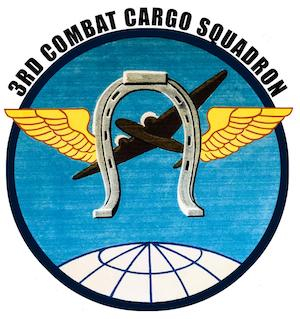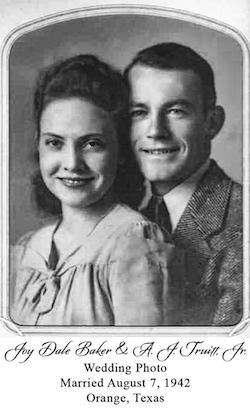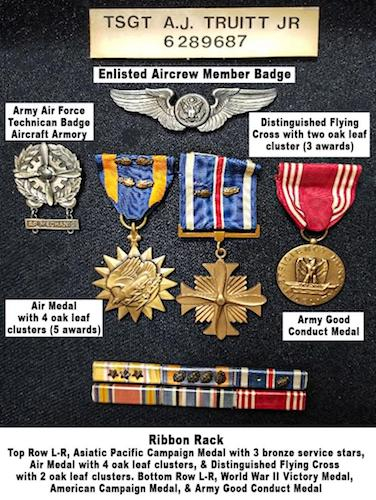 Technical Sergeant Alfred Joshua Truitt, Jr.
Technical Sergeant Alfred Joshua Truitt, Jr.
United States Army Air Forces, World War II
First Combat Cargo Group – Third Combat Cargo Squadron
January 11, 2023 - Alfred Joshua, Jr. was born on September 4th, 1918, just two months before the “Great War” ended in Europe. “A.J” as he was known, entered this world in the far east Texas town of Joaquin, located just a few miles from the Louisiana border. He was the youngest child of Ella Geneva Pinkston and A. J. Truitt, Sr., and joined a large family of siblings and half-siblings. His father, Alfred, Sr. had been previously married to Bertie Scott who died in 1899 at the age of 28.(1) During the 1920s and 1930s which included the great depression, A. J., Sr. provided for the family as a retail grocery salesman and cotton buyer.(2)(3)
On October 16th, 1940, A. J. registered for the first peacetime military draft in the history of our county at Precinct 16, Ward 3, Houston, Harris County, Texas. His registration card (D.S.S. Form 1), noted: he was 22 years of age; living at 1511 Leeland, Houston; his telephone number was P4917; and he was employed by the Houston Printing Company located at Polk and Dowling, Houston. Physically A. J. was described as white, five foot, eight and one-quarter inches tall, weighing 144 pounds with gray eyes, and brown hair. He listed a large scar on his right hand as a physical characteristic to aid in identification.(4)
 During World War II, Alfred Jr. served with the Third Combat Cargo Squadron which was one of the First Combat Cargo Group's four squadrons during World War II. It served in the China-Burma-India theatre where it transported personnel and supplies, primarily to forward areas, and evacuated casualties. Between September and October 1944, a detachment operated from Yunnan, China. While being primarily a C-47 Skytrain Squadron, it did also operate a few Commandos. The Third CCS received a Distinguished Unit Citation for transporting supplies, equipment, and personnel in French Indochina, China, and Manchuria in September 1945.(5)
During World War II, Alfred Jr. served with the Third Combat Cargo Squadron which was one of the First Combat Cargo Group's four squadrons during World War II. It served in the China-Burma-India theatre where it transported personnel and supplies, primarily to forward areas, and evacuated casualties. Between September and October 1944, a detachment operated from Yunnan, China. While being primarily a C-47 Skytrain Squadron, it did also operate a few Commandos. The Third CCS received a Distinguished Unit Citation for transporting supplies, equipment, and personnel in French Indochina, China, and Manchuria in September 1945.(5)
A. J.’s story is best told by his son Don who recently contacted me.
December 23, 2022
Dear Mr. Hume,
 My name is Don Truitt. I have an interesting story to share with your readers. It seems for some reason, not known to me, that my father was left out of the publication, “The Men and Women in World War 2 From Shelby County”. My Father, A. J. Truitt Jr. was born in Joaquin on September 4, 1918, to A. J. Truitt Sr. and Ella Pinkston Truitt. He graduated from Joaquin High school in 1936 being the highest ranked boy in the class, despite that he had to repeat the fifth grade due to his hand being mangled in the gears of an old washing machine. He joined the Army Air Force in 1937 and was accepted in the AAF’s air cadet program, because he wanted to fly. He began his cadet training at Randolph AAF base in San Antonio in January 1838. However, by May 1838, he had to resign and return home to Joaquin to help take care of his Father who had lost his left arm in an accident. His sister Pauline had also come home to help take care of A. J. Sr. She had just graduated from nursing school and was a practicing Registered Nurse. Early in 1941 A. J. Jr. accepted a job as a bookkeeper in the shipyards in Orange, Texas and married my mom, Joy Dale Baker, in August 1942. Early September of that year A. J. was notified by the draft board that he was about to be drafted, so he volunteered for the AAF and enlisted on September 30, 1942. He still wanted to fly but he knew he would not be invited back into the cadet program because once in and you resign, for any reason, you cannot be re-accepted. After he finished basic, he applied for, and was accepted, into the aircraft mechanics school at Alliance AAF base, Alliance, Nebraska. My mother rode the train from Fort Worth to Alliance to be with my dad while he was in school. She once told me that the six months she spent in Nebraska was the coldest she had ever been in her life. In May 1943 A. J. began the school for aircraft crew chiefs in Sedalia, Missouri, and continued until graduation in November 1943. He was promoted to corporal and was granted 30 days leave and A. J. and Joy took the train for Fort Worth to visit her parents.
My name is Don Truitt. I have an interesting story to share with your readers. It seems for some reason, not known to me, that my father was left out of the publication, “The Men and Women in World War 2 From Shelby County”. My Father, A. J. Truitt Jr. was born in Joaquin on September 4, 1918, to A. J. Truitt Sr. and Ella Pinkston Truitt. He graduated from Joaquin High school in 1936 being the highest ranked boy in the class, despite that he had to repeat the fifth grade due to his hand being mangled in the gears of an old washing machine. He joined the Army Air Force in 1937 and was accepted in the AAF’s air cadet program, because he wanted to fly. He began his cadet training at Randolph AAF base in San Antonio in January 1838. However, by May 1838, he had to resign and return home to Joaquin to help take care of his Father who had lost his left arm in an accident. His sister Pauline had also come home to help take care of A. J. Sr. She had just graduated from nursing school and was a practicing Registered Nurse. Early in 1941 A. J. Jr. accepted a job as a bookkeeper in the shipyards in Orange, Texas and married my mom, Joy Dale Baker, in August 1942. Early September of that year A. J. was notified by the draft board that he was about to be drafted, so he volunteered for the AAF and enlisted on September 30, 1942. He still wanted to fly but he knew he would not be invited back into the cadet program because once in and you resign, for any reason, you cannot be re-accepted. After he finished basic, he applied for, and was accepted, into the aircraft mechanics school at Alliance AAF base, Alliance, Nebraska. My mother rode the train from Fort Worth to Alliance to be with my dad while he was in school. She once told me that the six months she spent in Nebraska was the coldest she had ever been in her life. In May 1943 A. J. began the school for aircraft crew chiefs in Sedalia, Missouri, and continued until graduation in November 1943. He was promoted to corporal and was granted 30 days leave and A. J. and Joy took the train for Fort Worth to visit her parents.
For the next six months A. J. was stationed at four different AAF bases throughout the southern United States. It was during this time I was born in Fort Worth in July 1944 and about a month later A. J. received his deployment orders to go overseas. His orders said for him to report to Baer Field at Ft. Wayne, Indiana, but did not say a word about where they were going overseas. After a week of processing at Baer Field, in which the crew received a new C-47 aircraft, they took off on September 20, 1944. It was not until they departed Gander Field in Gander Bay, Newfoundland that the crew learned that they were headed to Kylmet, India. After they arrived in Kylmet they were assigned to the First Combat Cargo Squadron. In the ten months my father served overseas in the CBI theater he received five Air Medals and three Distinguished Flying Crosses. He was a Corporal when he arrived at Kylmet and was soon promoted to buck Sergeant and about three months later to Staff Sergeant. I would love to tell you what the circumstances behind the winning of both medals, but I don’t know. It seems that the records for the medals awarded in the CBI campaign were burned and lost at the Military Records Center at St. Louis in 1973. Some of the files have been reconstructed but only about 30% as of today. A. J. was like all other veterans of WW 2 in that he did not like to talk about his war experiences.
When I was about 13 or 14 years old, I remember one Christmas we spent in Joaquin and nearly all the immediate family was there. One of the activities they participated in was after supper they enjoyed playing poker with a quarter limit. All the family would gather around that big round table in the dining room to participate except for Momma Truitt, who would be busy running from room to room closing window shades to prevent anyone outside the house from seeing what was going on at the table. She having to protect her reputation being a charter member of the First Baptist Church of Joaquin. When the game finally began, all the grandchildren would be sitting around the table intensely watching the action. The conversation around the table, between the brothers and sisters, interested me more than the actual game being played. They were talking about what each of them did during WW2. A. J. was the seventh out of seven sons, the youngest of 13 children and was the only member of the family to serve in WW 2. One of his sisters asked him, “A. J. what medals did you win in the war?” A. J. hawed a bit and fueled by the mixed drink he was drinking said, “I won two. An Air Medal and a Distinguished Flying Cross.” “Actually, he won five Air Medals and three Distinguished Flying Crosses,” said my proud mother. “Oh my God, said my Aunt Hilda, “What on earth for?” “Primarily for kicking crap out of an airplane door,” A. J. replied. Then my Aunt Pauline said, “It’s my deal and I ain’t dealing nothing until I hear a story.” “Well, I’m not going to tell a story until someone fixes me another drink,” said a capricious A. J. He began, “One day in June 1945 we were scheduled to make an airdrop in China. As we were coming back across the hump, we hit a buzzard. It smashed through the plane’s windshield and temporarily blinded the pilot and disabled the co-pilot. I was sitting on a stool about three feet behind the pilot observing the engine instruments when we hit the buzzard. I immediately jumped off the floor and saw the pilot was seriously wounded by the blood all over his face. I pulled the pilot from his seat and began to trim the aircraft to prevent us from losing any more altitude. I told the radio operator to get the pilot’s goggles and his flight scarf which I wrapped the scarf around my face except my eyes and I slipped the goggles on. As I adjusted the trim wheels, the on-rushing wind through the broken cockpit glass was burning my ears so I turned the collar up on my flight jacket, zipped it up to my chin and began flying the aircraft home. The flight training, I had six years earlier began to kick in and about an hour and a half later we were home. I won the Distinguished Flying Cross, and the Radio Operator won the Air Medal for his efforts, and for treating the pilot and the co-pilot’s injuries inflight. Now, can we play poker.”
“Not until they hear what happened 20 days later,” said Joy Dale, my mother. Their curiosity suddenly intrigued the entire group at the poker table encouraged A. J. to continue his story. “Oh, my Lord,” groaned A. J., as he began his story. “We were once again assigned to deliver a cargo to China, primarily ammunition and Jeep parts, when behind me I heard this banging sound. The Radio Operator had gotten up from his seat, to get a cup of coffee, and as his body turned his foot did not as it became caught somehow in the railing below. His ankle began to swell, and it was obvious that he could not help me to push the cargo out the door when needed. So, I went to the pilot and told him of the situation in the back and he told me that the co-pilot could assist me. The Co-pilot was a second Lieutenant from somewhere back east that had just got his wings and had been sent overseas. He was not happy about having been assigned to the CBI theater and was especially unhappy about having to fly a C-47 transport plane. As they walked to the back of the plane, he began complaining about how he had not spent the last year of his life training to push cargo out of a C-47. On and on he went complaining about this and that until finally I had enough. I told him that if I had to listen to one more complaint from his mouth, I was going to take the .45 pistol out of my holster and hit him over the head so hard that it would be easy for me to dump his body out the door of the airplane and into the jungle. Then maybe they would find your body, about ten years later, and change your status from missing in action to killed in action. The cocky Co-pilot said nothing and did what I told him to do until the load was dispersed. It was not long after we returned to the base that the Colonel in charge of the whole operation called me into his office asked me to explain why I had threatened a second lieutenant. I told him the same story I just shared with y’all. Three days later we learned that the Second Lieutenant had been transferred back to the states and never flew again during the war. I was also told I had won the Distinguished Flying Cross, again.”



These are the only records found at the National Archives at St. Louis, Mo. My father died June 9, 2003. He is buried in the Truitt Cemetery, Joaquin, TX.
Thank You, Don Truitt
Editor notes:
“The Distinguished Flying Cross was established on July 2nd, 1926, and is awarded to any persons who, after April 6, 1917, distinguish themselves by single acts of heroism or extraordinary achievement while participating in aerial flight”.
“The Air Medal was created in 1942 and is awarded for single acts of heroism or meritorious achievement while participating in aerial flight”.
SOURCES:
(1): https://www.findagrave.com/memorial/74295462/alfred-joshua-truitt
(2): Year: 1920; Census Place: Justice Precinct 4, Shelby, Texas; Roll: T625_1846; Page: 6A; Enumeration District: 191
(3): Year: 1930; Census Place: Joaquin, Shelby, Texas; Page: 2A; Enumeration District: 0010; FHL microfilm: 2342124
(4): National Archives at St. Louis; St. Louis, Missouri; WWII Draft Registration Cards for Texas, 10/16/1940-03/31/1947; Record Group: Records of the Selective Service System, 147; Box: 1523
(5): The Curtiss Commando Page 3 Combat Cargo Squadron









